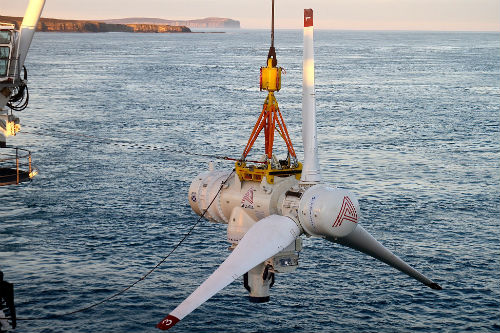The conference has attracted delegates from across the world and has been organised by PRIMaRE (Partnership for Research in Marine Renewable Energy), a consortium of marine renewable energy experts across higher education, research and industry, who have joined together to establish a network of excellence centred in the south of the UK.
The event takes place at a critical time, when the marine energy sector is facing major challenges around cost and risk reduction if it is to play a significant role in our future low carbon energy mix.
The work of facilities such as Wave Hub and the European Marine Energy Centre (EMEC), alongside flagship commercial projects like MeyGen, show that the industry has a strong platform for future success, but only with further development of the underpinning technologies and the backing of carefully targeted government schemes.
The conference will explore how industry and academia is working together to ensure that the marine energy sector can achieve its full commercial potential, maximising job creation and export opportunities, whilst allowing the UK to remain a global leader in the associated engineering and policy expertise.
The PRIMaRE network has gone from strength to strength over recent years, developing a range of new partnerships through the Annual Conference and many other knowledge transfer events.
One of the key individuals behind its success has been Deborah Greaves, Professor of Ocean Engineering at the University of Plymouth, who was recently awarded an OBE for her contributions to research into offshore renewable energy.
Deborah, who originally studied Civil Engineering at Bristol (BEng 1988), said: “Offshore renewable energy is a fast-moving sector, with many complex research challenges and questions that need addressing. It has come a long way in recent years, and it is highly likely what we will see in 20 years will be different from the technologies existing today.
“The partners in the PRIMaRE network – working in conjunction with industry – can certainly be at the forefront of putting those developments into practice.”
Dr Paul Harper, from the University of Bristol’s Cabot Institute for the Environment and Chair of PRIMaRE 2018, added: “The variety of presentations from both academia and industry at this year's conference is testimony to the success of the PRIMaRE network in promoting collaboration and the huge potential for ongoing Research & Development in marine renewables.”
Mark Leybourne, Associate Director of ITPEnergised, one of the conference speakers, added: “The wave and tidal stream energy sector can deliver a whole new industry to the UK, through UK based companies based in coastal regions working locally whilst developing an export capability as part of Global Britain.
“To do this it needs to move from the deployment of single machines and small arrays, into larger projects. For the last two years there has been no government support for this step, based on a challenge from the government on whether the industry can reduce its costs through mass deployment, whether it can be a world leading technology in a sizeable global market, and whether it can help the UK reduce its carbon emissions.
“A recent report by the Offshore Renewable Energy Catapult has confirmed it can do all three of these. All that is now missing is a revenue support system that keeps the costs of innovation off consumer bills and the industry has responded to that by designing one based on tax rebates. We look forward now to working with the government on how to boost a renewable energy sector where, for once, the UK is exporting technology rather than importing.”
In addition to the PRIMaRE network, the conference is being generously supported by the University of Bristol’s Cabot Institute for the Environment and the School of Civil, Aerospace and Mechanical Engineering (CAME).
